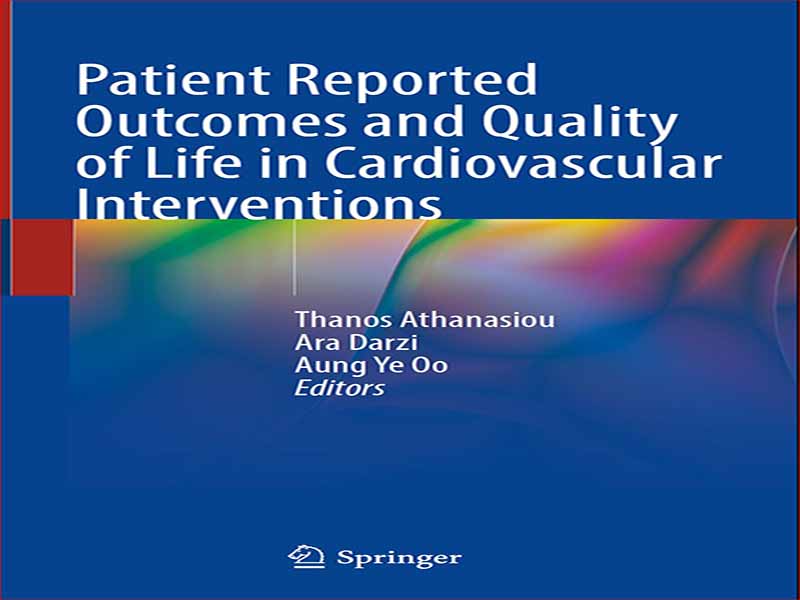- عنوان کتاب: Patient Reported Outcomes and Quality of Life in Cardiovascular Interventions
- نویسنده: Thanos-Athanasiou,-Ara-Darzi,-Aung-Ye-Oo
- حوزه: قلب و عروق
- سال انتشار: 2022
- تعداد صفحه: 432
- زبان اصلی: انگلیسی
- نوع فایل: pdf
- حجم فایل: 17.8 مگابایت
طی چند دهه اخیر، اثر ترکیبی کاهش مرگ و میر و عوارض عمده پس از مداخلات قلبی عروقی در ترکیب با این واقعیت که پزشکی بیشتر بیمار محور شده است، تأثیری بر وضعیت عملکردی بیماران تحت توجه داشته است.
توانایی و زمانی که بیماران می توانند فعالیت های روزمره خود را پس از مداخله از سر بگیرند به طور فزاینده ای مورد تحقیق قرار گرفته و به عنوان یک شاخص کلیدی نتایج در نظر گرفته شده است.
اغلب پزشکان تأثیر بیماری و مداخلات پیشنهادی را بر وضعیت عملکردی بیمار و جنبههایی از کیفیت زندگی که برای آنها مهم است، در نظر میگیرند.
سازمان بهداشت جهانی (WHO) کیفیت زندگی را اینگونه توصیف میکند: «ادراک یک فرد از موقعیت خود در زندگی در چارچوب فرهنگ و نظام ارزشی که در آن زندگی میکند و در ارتباط با اهداف، انتظارات، استانداردها و نگرانیهایش».
در بیماری های قلبی عروقی، پرسشنامه های گزارش شده توسط بیمار به ارائه معیارهای ذهنی، معتبر و قابل اعتماد برای کیفیت زندگی کمک می کند، نه بر اساس علائم قلبی تشخیص داده شده توسط پزشک.
معیارهای کیفیت زندگی به دلیل ارتباط آنها با وضعیت عملکردی بیماران به طور فزاینده ای برای گنجاندن در آزمایشات بالینی ضروری می شود.
با پیشرفت در مداخلات کاتتر از راه پوست و با افزایش جمعیت، بدون شک مقایسههای بیشتری بین چنین رویکردهای جدید برای جراحی باز قلب وجود خواهد داشت. در دسترس بودن معیارهای کیفیت زندگی معتبر به چنین مقایسههایی کمک میکند تا از آنچه برای بیمار مهم است سودمند باشد.
افزایش نسبت بیماران بالای 80 سال که به بیماری قلبی مراجعه می کنند، منجر به افزایش تقاضا برای تخصص های قلبی عروقی می شود.
Over the last few decades, the combined effect of declining mortality and major morbidities after cardiovascular interventions in combination with the fact that medicine becoming more patient-centred has brought the impact on functional status of patients under the spotlight.
The ability and the time patients can resume their day-to-day activities post-intervention has been increasingly researched and considered as a key indicator of outcomes.
More often physicians are also considering the impact of the disease and the proposed interventions on patient’s functional status and aspects of quality of life that are important to them.
The World Health Organization (WHO) describes QOL as “an individual’s perception of their position in life in the context of the culture and value system in which they live and in relation to their goals, expectations, and standards and concerns”.
In cardiovascular disease, patient-reported questionnaires help providing subjective, valid and reliable measures for QOL, and not based on physician-recognised cardiac symptoms.
QOL measures are increasingly becoming necessary to be incorporated in clinical trials due to their relevance to patients’ functional status.
With the advances in percutaneous catheter interventions and with ageing population, there will undoubtedly more comparisons between such novel approaches to open cardiac surgery. The availability of valid QOL measures will assist in such comparisons to benefit what matters to the patient.
An increment in the proportion of patients above the age of 80 years presenting with cardiac disease will lead to increased demands on cardiovascular specialties.
این کتاب را میتوانید بصورت رایگان از لینک زیر دانلود نمایید.
Download: Patient Reported Outcomes and Quality of Life in Cardiovascular Interventions




































نظرات کاربران